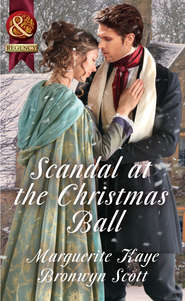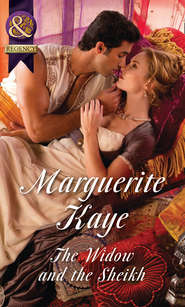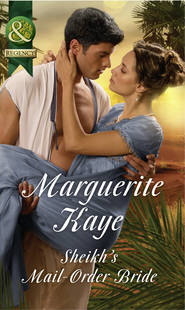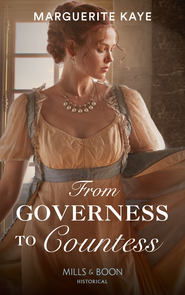По всем вопросам обращайтесь на: info@litportal.ru
(©) 2003-2025.
✖
A Winter Wedding: Strangers at the Altar / The Warrior's Winter Bride
Настройки чтения
Размер шрифта
Высота строк
Поля
Innes shrugged. ‘I can see it’s a lovely view. I’d forgotten.’
Without waiting on her, he turned on his heel and began to walk quickly up the slope towards the central staircase. ‘Like someone determined to swallow their medicine as quickly as they can and get it over with,’ Ainsley muttered, stalking after him.
‘What was that?’
‘This may be a monstrosity to you, Innes, but to someone accustomed to a terraced house in Edinburgh, it’s magical.’
Innes stopped abruptly. ‘Ach, I’m like a beast with a sore head. I’m sorry. It’s not your fault.’
No, it was most definitely this place. Curious as she was, and with a hundred questions to boot, Ainsley had no desire to see him suffer. ‘We could leave it for today. Or I could look around myself.’
‘No,’ Innes said firmly, ‘it has to be done.’ He took her hand, forcing a smile. ‘Besides, you came here thinking you’d be lady of the manor—you’ve a right to see over your domain. I’m only sorry that it’s bound to be a disappointment.’
‘I did not come here with any such expectations. Aside from the fact that I know absolutely nothing about the management of a place this size, I am perfectly well aware that your people will regard a destitute Edinburgh widow without a hint of anything close to blue in her blood as nothing more than an upstart.’
Innes gave a startled laugh. ‘You’re not seriously worried that people here will look down their noses at you, Ainsley?’
‘A little,’ she confessed, embarrassed. ‘I hadn’t really thought about it until I arrived here yesterday. Then your boatman...’
‘Ach! Blasted Eoin. Listen to me. First, if there’s an upstart here, then it’s me. Second, for better or worse, I’ll be the laird while I’m here, and while you’re here, I will not tolerate anyone looking down their noses at you. Third, the state of your finances are nobody’s business but our own.’ He pulled her closer, pushing a strand of her hair out of her eyes. ‘Finally, though I have no intention of playing the laird and therefore there’s no need for you to play lady of the manor, if I did, and you did, then I think you’d play it very well. And on the off chance you couldn’t quite follow me,’ he added, ‘that was me saying you’ve not a thing to worry about.’
She felt a stupid desire to cry. ‘Thank you, I will try not to let you down.’
‘Wheesht, now,’ he said, kissing her cheek. ‘You’ll do your best, and that’s all I ask. Anyway, it’s not as if you are stepping into a dead person’s shoes. My mother died when I was eight years old.’
‘And your father never remarried?’
Innes gave a crack of laughter. ‘What for, he’d already produced an heir and a spare.’
‘What about your brother. Did he...?’
‘No.’
Another of those ‘do not dare ask’ faces accompanied this stark denial. And Innes would not be married either, were it not for the terms of the old laird’s will. Were the Drummond men all misogynists? Or perhaps there was some sort of dreadful hereditary disease? But Innes seemed perfectly healthy. A curse, then? Now she was being utterly fanciful. It was this place. Ainsley gave herself a little shake. ‘Well, then, let us go and inspect this castle of yours, and see what needs to be done to make it habitable.’
* * *
Everything inside Strone Bridge Castle was done on a grand scale. The formal salons opened out one after the other around the central courtyard with the Great Hall forming the centrepiece, heavy with geometric panelling, topped with rich fretwork ceilings like icing on a cake, or one of those elaborate sugar constructions that decorates the table at a banquet. Massive fireplaces and overmantels rose to merge the two, and everywhere, it seemed to Ainsley, every opportunity had been taken to incorporate heraldic devices and crests. Dragons and lions poked and pawed from pilasters, banisters and pediments. Shields and swords augmented the cornicing, were carved into the marble fireplaces and fanned out above the windows. It was beautiful, in an oppressive and overwhelming way.
The turrets that marked each corner were dank places with treacherous-looking staircases winding their way steeply up, and which Ainsley decided she did not need to climb. ‘They serve no real purpose,’ Innes told her. ‘A whim of my father’s, nothing more.’
* * *
After two hours and only a fraction of the hundred and thirty rooms, she had seen enough for one day. Back in the courtyard, she gazed up at the central tower, which was square and not round, and faced directly out over the Kyles of Bute. Bigger than the others, it seemed to contain proper rooms, judging from the wide windows that took up most of the sea-facing wall on each of the four stories. Ainsley wrestled with the heavy latch, but it would not budge.
‘It’s locked.’ Innes made no attempt to help her. ‘Has been for years. Most likely the key is long gone, for it’s not on here,’ he said, waving the heavy bunch of keys he carried.
Ainsley frowned at the lock, which seemed surprisingly new, and showed no sign of rust, wondering how Innes would know such a thing when he himself had not been here for years. ‘The view from up there must be spectacular,’ she said, looking back up at the battlements.
Innes had already turned away. ‘We’ll take a look at the kitchens.’
‘There must be a door from inside the castle,’ Ainsley said, frowning at the tower in frustration, trying to recall the exact layout of rooms that lay behind it. ‘Is that the dining room? I don’t recall a door, but...’
‘The door isn’t in the dining room.’ Innes was holding open another door. ‘Do you want to see the kitchens? I was hoping to get out to some of the farms this afternoon.’
He sounded impatient. Though this was all new to her, for him it was different. ‘I can come back myself another time,’ Ainsley said, joining him.
‘I don’t want you going up there,’ Innes said sharply. ‘It’s not safe.’
She cast a dubious look at the tower, thinking that it looked, like the rest of the castle, neglected though sound, but Innes was already heading down the narrow corridor, so she picked up her skirts and walked quickly after him.
A few moments later she forgot all about the locked tower, gazing in astonishment at the table that ran almost the full length of the servants’ hall. It looked as if it would sit at least fifty. ‘Good grief, how many staff does it take to keep this place running?’
Innes shook his head. ‘I’ve no idea. Even in my youth, most of the rooms were closed up, save for formal occasions, and there were few of those. My father was not the most sociable of men.’
They exited the servants’ hall and entered the main kitchen, which had two bread ovens, a row of charcoal braziers, a stove the size of a hay cart and the biggest fireplace Ainsley had ever seen. Out through another door, they wended their way through the warren of the basement, past linen rooms and still rooms, pantries and empty wine cellars, and then back up a steep flight of stairs to another door that took them out to the kitchen gardens.
Innes turned the lock and turned his back on the castle. ‘As you can see, the place is uninhabitable,’ he said.
He sounded relieved. She couldn’t understand his reaction to it. ‘Is the building itself in such a poor state of repair, is it the cost of restoring it you’re worried about?’
‘It’s sound enough, I reckon. There’s no smell of damp and no sign that the roof is anything but watertight, though I’d need to get one of my surveyors to take a look. But what would be the point?’
‘I have no idea, but—you would surely not wish to let it simply fall into ruin?’
‘I could knock it down and get it over with.’ Innes tucked the weight of keys into his coat pocket with a despondent shrug. ‘I don’t know,’ he said heavily, ‘and I think I’ve more pressing matters to consider, to be honest. Maybe it was a mistake to start with the castle. For now, I think it would be best if you concentrated on the immediate issue of making the Home Farm a bit more comfortable. Speak to Mhairi, she’ll help you. I’ll need to spend some time out on the lands.’
Ainsley watched him walk away, feeling slightly put out. He was right, their living quarters left a lot to be desired, and it made sense for her to sort them out. ‘Whatever that means,’ she muttered. The idea of consulting the rather forbidding Mhairi McIntosh did not appeal to her. Madame Hera had suggested that Timid Mouse appeal to her housekeeper’s softer side. Ainsley was not so sure that Mhairi McIntosh had one.
Besides, that wasn’t the point. She had not come here to set up Innes’s home for him, but to provide him with objective advice. How was she to do that if she was hanging curtains and making up beds while he was out inspecting his lands? Excluding her, in other words, and she had not protested. ‘Same old Ainsley,’ she said to herself in disgust. ‘You should be ashamed of yourself!’
* * *
Dear Madame Hera,
My husband’s mother gave me a household manual on my wedding day that she wrote herself. It is extremely comprehensive, and at first I was pleased to know the foods my husband prefers, and how he likes them served. However, I must say that right from the start I was a bit worried when I read what his mother calls ‘The Order of the Day’—and there is one for every day. I do try to follow it, but I confess I see no reason why I must do the washing on a Wednesday and polish the silver on a Saturday, any more than I see why we have to have shin of beef every single Tuesday, and kippers only on a Thursday. And as to her recipe for sheep’s-head soup—I will not!
I tried to tell my husband that his mother’s way is not the only way. I have many excellent recipes from my own mother that I am sure he would enjoy. I tried, with all my wifely wiles, to persuade him that I could run the household without following his mother’s manual to the letter. He spurned my wifely wiles, Madame, and now he is threatening to have his mother, who has a perfectly good house of her own, to come and live with us. I love my husband, but I do not love his mother. What should I do?
Desperate Wife
Ainsley pulled a fresh sheet of paper on to the blotting pad. It was tempting to suggest that Desperate Wife invite her own mother to stay, and even more tempting to suggest that she simply swap abodes herself with her husband’s mother, but she doubted Felicity would print either solution. Instead, she would advise Desperate Wife to put her foot down, throw away the manual and claim the hearth and home as her own domain. It was Madame Hera’s standard response to this sort of letter, of which she received a great many. Mothers-in-law, if the readers of the Scottish Ladies Companion were to be believed, were an interfering lot, and their sons seemed to be singularly lacking in gumption.
Claiming this hearth and home as her own had turned out to be relatively easy. Yet looking around the room, which in the past ten days, like the rest of the Home Farm, had been made both warm and comfortable, Ainsley felt little satisfaction. Mhairi McIntosh had proved cooperative but reserved. She had not looked down her nose at Ainsley, nor had she mocked or derided a single one of her suggestions, which had made the task Innes had given her relatively easy, but it was not the challenge she had been looking forward to. She had, in essence, been relegated to the domestic sphere when he had promised her a different role.
Irked with herself, Ainsley tucked Madame Hera’s correspondence into her leather folder and pushed it to one side of the desk, covering it with the latest copy of the Scottish Ladies Companion, which Felicity had sent to her. There could be no doubt that Innes needed help, but he had made no attempt to ask her for it. Though she rationalised that he most likely thought he’d fare better with his tenants alone, as the days passed, she felt more excluded and more uncomfortable with trying to address this fact. She was not unhappy, she was not regretting her decision to come here, but she felt overlooked and rather useless.
Standing on her tiptoes at the window, she could see the sky was an inviting bright blue above the monstrous hedge. Ainsley made her way outside, making for her favourite view out over the Kyles of Bute. Tiny puffs of clouds scudded overhead, like the steam from a train or a paddle steamer. It was a shame that the dilapidated jetty down in the bay was not big enough to allow a steamer to dock, for it would make it a great deal easier to get supplies.











